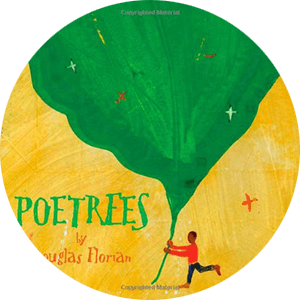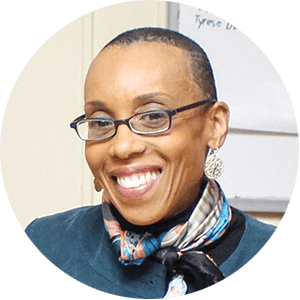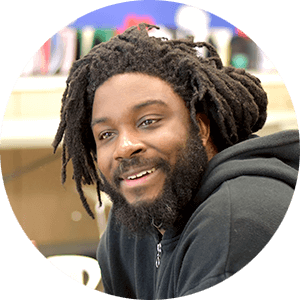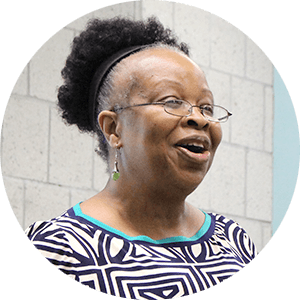Author Tips
This spring, Queens Library hosted several children’s and YA authors to talk about their books and how they became writers.* (*These author talks were part of the South Jamaica Reads program and were made possible through generous funding from The Pinkerton Foundation.) Many discovered their love of writing and literature at the library! Do you love literature? Check out our interviews with some of these writers – and then check out their books as part of your summer reading!
Douglas Florian Andrea Davis Pinkney Jason Reynolds Rita Williams-Garcia

Queens Library: What role did libraries play in your life growing up?
Florian: I enjoyed going to libraries when I was young and was a fairly voracious reader, enjoying science fiction (Ray Bradbury and Isaac Asimov) as well as fiction (Joseph Heller, Aldous Huxley, and George Orwell). Growing up in Queens and attending the public schools there, the Central Library branch in Jamaica was my main source of research and art books for many years. It still has a superb and huge art book collection.
Queens Library: What role do libraries play now?
Florian: I stop by libraries whenever I'm researching information to help me write my poems. I may find books or magazines that I wouldn't find if I only looked online. There's usually information or pictures there to surprise me. And my head is always spinning with ideas when I finish a reading session in a library!
Queens Library: How did you become a poet? Why poetry?
Florian: My love of poetry began when I wandered into the Fresh Meadows library in Queens one hot summer day when I was 12 or so and discovered the humorous poetry of Ogden Nash. Until then I thought poetry was dull and boring. Nash is still my favorite for witty pithy poetry.
Queens Library: If there were one life lesson you could impart to your readers, what would it be?
Florian: One thing I have always believed in is to keep growing and learning as a person. I've always tried to improve and develop any skills and talents I had to the best I could and to try different ways of writing or drawing. This has helped me to become a better author and artist, as I never get bored.

Queens Library: You’ve said that you start by doing research at a library. Do libraries play a large role in your life?
Andrea Davis Pinkney: Libraries definitely play a large role in my life and in my work as a children’s book author. It’s like a default. The first stop is the library. The librarians know me, they see me coming in, and the one thing that I will say that I love is librarians will go to the end of the earth to get you the research and information you need. I could have the most obscure fact and my local librarian will search that fact down, get me the information. I’ve also had many moments that I call a book emergency. Where there’s a book I have to have - I’m hungry for it or I just have a hankering to read it and they can produce that quickly. They’re like fairy godmothers. They can bring that book quickly.
Queens Library: What would you say to reluctant readers about how or why they should make reading a bigger part of their lives?
Andrea Davis Pinkney: As someone who grew up myself struggling in school, I would say that books can unlock that door. If you are a struggling reader, read the pictures. It’s the great myth that you have to finish a book that’s 300 pages. Just read the first three sentences. I always say that to struggling readers that I work with. Just put your hands on the book, just open it, and read the first three sentences and close it. Then tomorrow read three more sentences. It doesn’t have to be a chore. Reading can be fun and we can take it in bite-sized chunks.
Queens Library: How and why is reading important?
Andrea Davis Pinkney: Reading is the way, it’s that door, it’s that portal, it gets us to new places. The other thing I’ll say about reading is I want to not feel alone on this earth. Reading reminds me through the stories and experiences of others that I can really experience my own humanity and things that make me happy or sad. I can identify with that author or that character.
Queens Library: If there were one life lesson that you could convey to your readers, what would it be?
Andrea Davis Pinkney: My one lesson – I have many, but one that stays with me is that you have a story and it matters. Every experience, emotion, interaction is part of your story. Small details from your own experience can resonate, help, or open a door for someone else. And I hope that people remember that.

Queens Library: You recently said in a PSA for school libraries that libraries are places of recognition. How did your relationship with the library change from childhood to university, where you were an English major?
Jason Reynolds: Then it became about understanding that librarians were literally figures of assistance, which I did not understand. For lack of better terms, they were at your service. They were these people who were super smart when it came to understanding how to traverse and manipulate the library itself.
It’s like having a tour guide. You show up and somebody’s there and says, “You have no idea how to get from A to B. I just so happen to be the master of orientation. Let me take you on this walk. Is there anything you’d like to see along the way?”
You say “I’d like to see the towers,” and they say “Come this way” or “I’d like to see the mountains,” and they say, “Come this way.”
There’s something about that that I really grew to love. It gave me some peace. The library, especially college or university libraries, they’re so daunting. They’re ten floors of millions of books and stacks of papers and newspapers, journals, essays, microfiche. I don’t know where to begin. You have LexisNexis and all these databases that are all even more overwhelming.
You’re like “I have no idea where to begin.”
There’s some librarian who is like, “Give me your keywords. All you have to do is say three or four words, and I will show you everything you need to see.” Isn’t that what we’re all looking for, whether it be in a librarian, or in a parent, or in a teacher? “I can tell that you’re lost. Give me a few words, give me a few navigating points. I will help you do the rest.”
Queens Library: You’ve often talked about wanting to write books that are not boring for young people. What makes a book not boring?
Jason Reynolds: A few things. You have to start your books a chapter late and end your books a chapter early. What that does is creates - you drop your reader right in the middle of the problem and you end the book right in a cliffhanger. That infuriates people but it drives the desire for reading.
Queens Library: What would you say to reluctant readers about how and why they should make reading a bigger part of their life?
Jason Reynolds: My whole point for the reluctant reader is less about literature and more about literacy. One of the big missteps that a lot of us are making is that there’s this impression that the only way in, the only way to read is to read a novel. A lot of brilliant people don’t read novels. There are a lot of people who only read essays or scientific journals. I don’t believe that Neil deGrasse Tyson is reading novels. I’m willing to bet that he’s not but he’s one of the most brilliant men on earth and one of the most empathetic. We have to start complicating the argument a little bit. I like to tell reluctant readers that I don’t care what you read. Most reluctant readers will tell you they love Fortnight, Minecraft, Call of Duty. They love video games. They would read those books. There are all these cheat sheets, strategy guides. Read those.
If you’re like, I like basketball, guess what? ESPN the magazine still exists. Sports Illustrated still exists, sports blogs. Read the sports section in the newspaper. I don’t care what you read.
What I really want reluctant readers to understand is that your reluctance has less to do with 'he needs to be more empathetic and understand literature' and has more to do with helping you understand that I don’t want you to lead a reluctant life. In order for you not to live a reluctant life, you need to be able to engage with language.

Queens Library: Since we’re in the library, I wanted to ask you what role did the Queens Library play in your life growing up?
Rita Williams-Garcia: When I wanted to know how to become a writer, I went to the St. Albans branch which was right around the corner from my grandmother’s house, and I checked out the book The Writer’s Market and The Writer’s Handbook when I was twelve. And I kept checking those books out over and over. And the librarian said, Okay, you have to let other people check those books out. It was because that branch had those reference tools right there. It helped me to become serious at an early age and to feel like someone was taking me serious. That St. Albans branch was my place where I felt like yes, I am a writer.
Queens Library: What would you say to a reluctant reader about why reading is so important?
Rita Williams-Garcia: Well, you know you always want to be included. You always want to be a part of things. When you are on the outside of books or stories, you’re missing all of these connections you yourself can make with books. When you can connect with a book is a greater part of being able to connect with yourself. And then you have connection with others. No other medium quite does that like books.
Queens Library: If there were one life lesson you could convey to your readers, what would it be?
Rita Williams-Garcia: Don’t be afraid to dream and pursue it. Bit by bit. That’s what I did. Word by word. Sentence by sentence. Every day I lived in the promise of a dream. That was how I was able to attain it.
*These author talks were part of the South Jamaica Reads program and were made possible through generous funding from The Pinkerton Foundation.